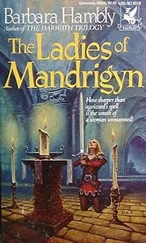Hast thou quarreled? Dolley had asked Burr at once, and immediately felt herself blush for the suggestion that Sophie might be his mistress—which of course Dolley was virtually certain Sophie was, that summer of 1803. Her certainty was confirmed when Burr had grinned, like a wicked older brother to whom Dolley could say anything.
“We have not,” he retorted. “Because a man shares a woman’s bed doesn’t mean he has to be blind to all besides her beauty. And no lovers’ spat would excuse a man for inventing such a rumor about a woman. I merely wondered, that’s all. She’d make a fine spy.”

Stifling in the closed carriage as she fled the capital, one arm draped over the jolting stacks of boxes and bundled papers that threatened to avalanche over her every time the wheels struck another rut, Dolley could see her old friend’s face as clearly as if the conversation had occurred yesterday instead of eleven years ago.

“Why should a woman return to this country, whose current government ruined her family, caused the deaths of her father and brother, and drove her and her mother out as camp-followers of the retreating army?” Burr’s eyes, brilliant as a poet’s, narrowed as if he were reading a court document; he had looked past Dolley and through the oval drawing-room’s long windows to the half-built boundary-wall and the inevitable fair of hawkers and hucksters, cockfights and dogfights, in the grounds behind the President’s Mansion that accompanied the Fourth of July celebrations.
The Fourth of July was always boisterous in the Federal City, which was then only beginning to be called after its founder. That year—1803—was quadruply ebullient: President Jefferson had announced, just that morning, that France had sold the United States all its territory of Louisiana.
There would be no fighting over the West, no threat of Spain once again closing the Mississippi to trade. As a Quaker, Dolley’s soul had been deeply satisfied: Fourteen million dollars was less costly than any war she’d ever heard of, and every land-speculator in the country was in ecstasies. Jefferson had held a mammoth levee at the Executive Mansion at noon, and private celebrations were being planned all over the city. Burr had come to the levee alone, and had exchanged no more than a dozen words with Sophie, but turning her head Dolley could pick out her friend Sophie Hallam, in very stylish second mourning, deep in conversation with Hannah Gallatin, the wife of the Secretary of the Treasury.
“More curiously,” Burr went on, following her gaze, “ how would she return? Mrs. Hallam’s needlework is unexcelled, naturally—” He lifted his punch-cup in salute to Dolley’s gown of yolk-yellow silk and silver spider-gauze that had been Sophie’s creation. “Yet a woman needs money for materials, to set up as a mantua-maker, much less to purchase a house in Philadelphia—which she did—and another here, which she also did, in excellent parts of both towns. And no one I’ve ever spoken to has heard of a merchant or banker in England by the name of Hallam. A woman can trade on the capital which, God help them, God gives to women—but it generally leaves its mark, on a woman’s soul and on her body also. And I haven’t seen it.”
Her cheeks hot with anger for Sophie, Dolley drew Burr a little further into the relative privacy of the window—the oval drawing-room which the Adamses had used as an entrance-hall was as full as it could hold—and whispered, “I trust thou wilt understand that should I hear a single word of this ever again from any other source, dear as I hold thee, my friend, our friendship will be at an end.”
“I do understand, Mrs. Madison,” replied Burr, inclining his head. “And you will not. I’ve spoken of this to you alone, solely because of all the women in this city, only you and Jefferson’s daughters know the lady well.”
Above him, flanked by the rather faded green curtains that Jefferson had purchased for the oval salon, Washington’s portrait had gazed into space, as if fiercely disapproving still of Burr after all those years. In addition to the usual Congressmen, speculators, and place-servers, the crowd in the oval drawing-room was enlivened by a number of delegates from Western Indian tribes, in full glory of feathers and paint, and representatives from the piratical Barbary States in a gaudy glory of turbans and pearls.
“However,” Burr went on quietly, “those ladies seem to have taken their broods back to Virginia for the foreseeable future. Indeed, it isn’t my business to speak of what I cannot prove and only suspect—fond as I am and continue to be of the lady! But as Vice President of this country, I suppose it is my duty to at least let the wife of the Secretary of State know that the thought has crossed my mind that there may be an agent of Britain in our midst.”
His words returned to Dolley now. Through a haze of dust she watched American militiamen staggering along the dirt road beside the carriage, or straggling in the distance among the trees. Joe kept the horses as close to a gallop as was possible in the ruts of Pennsylvania Avenue: Clinging with one hand to the strap, the other arm fending off boxes, Dolley felt as if her bones would be broken even if they didn’t manage to overturn the vehicle.
Through the windows she could see soldiers as well as civilians driving wagons full of supplies. Others rode horses or mules still in the harness of some abandoned dray or limber. There were others, Dolley saw with sudden anger—rough men both black and white in laborers’ clothes—driving carts or pushing barrows full of silk dresses, of silver services hastily bundled up in sheets or shawls, even small pieces of expensive furniture or elaborate, imported screens.
Sophie had been right. Such men had probably been just waiting for her carriage to leave the Mansion, to begin looting what she could not save.
Would Sophie wait there, too, for the British troops to come?
Burr may have been a schemer—and later, a traitor—but he had a keen judgment of humankind.
And under ordinary circumstances it wouldn’t have mattered what Sophie was in the habit of telling the British Minister. All ministers had informants, who picked up bits of news. It was part of a minister’s job. Dolley acknowledged that Sophie—known to be a friend to both Jefferson and Abigail Adams, whose first successes had been due to her friendship with Martha Washington—would be a logical choice for such work.
But these were not ordinary circumstances.
Her mind circled back to Jemmy, sixty-three years old, riding the Bladensburg battlefield in range of the British guns.
I should not have left.
The carriage jolted, veered around a group of stumbling men, without knapsacks or rifles, whose dust-smeared militia uniforms bore the marks of powder but not of blood.
If Jemmy is taken…
He won’t be, she told herself grimly. He will have had the sense to flee, when his Army dissolved about him.
But Jemmy, in masterminding Jefferson’s election, had read hundreds of scoffing broadsides that mocked Jefferson’s “cowardice” in fleeing Richmond ahead of Benedict Arnold’s forces; in getting out of Monticello minutes before Tarleton’s dragoons emerged from the woods. The jeers had followed Jefferson for twenty years, never mentioning the fact that Tarleton would almost certainly have hanged the author of the Declaration of Independence, had he caught him.
Would the recollection of the mockery keep Jemmy on the field a few fatal minutes beyond his own last chance to flee?
Читать дальше






